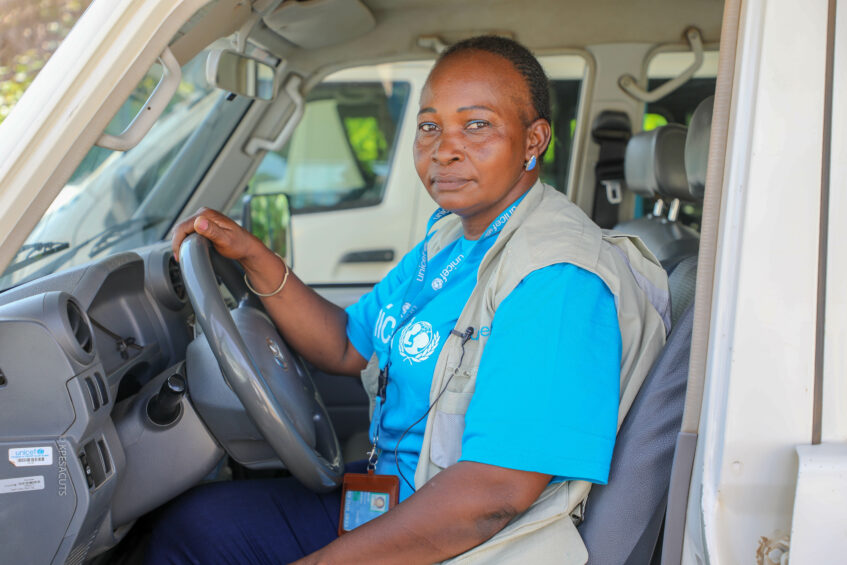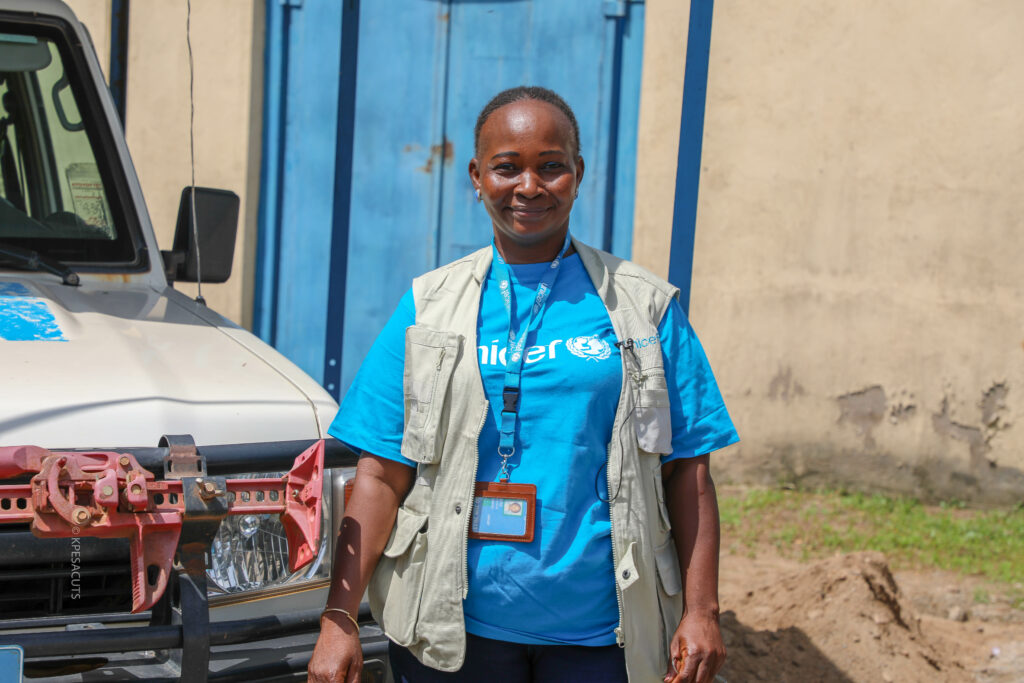You are here: Home | Featured | Interviews | Meet Margaret, one of the longest serving female drivers in the country

A 44-year-old Margret Mite Arona has drove for the last 22 years. Photo Credit Lou Nelson - Eye Radio
Meet a 44-year-old Margaret Mite Arona, one of the longest serving female drivers in South Sudan.
Mite who hails from Yambio County of Western Equatoria State began her driving career 22 years ago after acquiring a mechanic and driving training from World Vision.
According to Mite, she initially wanted to become a Nurse to ensure that patients receive proper care they need, manage physical needs, prevent illness and treat health conditions.
The mother of four could not achieve this dream because Mite and her family were unable to afford the cost.
Before Mite found her way to World Vision, she used to blow local alcohol to put food on the table for her family.
This, according to Mite, was not enough to cater for her personal and family needs.
In September 1997, Mite was subcontracted for the first time to assist in buying maize from subsistence farmers and store it in various World Vision storage facilities in Western Equatoria.
Being a subcontractor, Mite at that time was earning an equivalent of 400 pounds, 2000 grams of salt and two bars of soap as her monthly incentive.
She began the training with basic car maintenance, replacing tyres, changing engine oil and fixing other minor issues in the car.
“After the contract for buying maize ended, they selected me to work with mechanics in the garage.”
“I stayed in the garage for three months where I was helping in changing the tires, fixing back the brake shoes and engine. I was working together with the mechanics,” Mite told Eye Radio in an interview.
Based on her experience, Mite got an opportunity to work as a driver with the UN children’s agency, UNICEF decades ago.
Till date, Mite is among the few women who have driven for the last 20 years in South Sudan.
In countries like Zimbabwe, public transport jobs have for long been the preserve of men.
Recently, Zimbabwe registered an increase of women occupying previously male-dominated spaces as the result of efforts spanning several decades.
In South Sudan, there is no specific data for female drivers serving in public, private and nongovernmental organizations.
Mite is however encouraging women to join practical oriented work to change the attitudes towards women in the country.
“My message to women is let them not just sit at home that they don’t know how to speak English.”
“Let them move around if they get any casual work which doesn’t not have much salary, let them offer themselves to do it. When they do more they will earn high in the future,” Mite added.
Driving in South Sudan in the public and private sector is considered to be a male-dominated workplaces though it is not clear if this is associated with the norms or stigma.
Mite however said her work colleagues are much more positive about sharing the road with women and she’s finally getting the moral support she deserves.
Despite ending up in Primary six, Mite said her effort is an inspiration to other young women who intend to join the profession.

Driving verses domestic work
Like other women in the country, Margret Mite Arona wakes up early in the morning, makes tea for her family and leaves for work.
Based on the schedule, Mite, like other drivers at UNICEF, reports for work at 6:00 am, gets the car and picks other staff.
Sometimes Mite goes back at 5:00pm local time and prepares dinner for her family.
“Always I always cook meat, I can cook fish and other food that I know I can cook and it gets ready quickly. I can do that and also I cook vegetables,” Mite narrated to Eye Radio.
She however said: “for me I can’t say driving or working is a challenge because that is what I am doing and is supporting me with the children.”
“If I say it is a challenge, what am I going to do with the children so I am happy with my work and I am doing it with passion,” Mite added.
Reports suggest that women are responsible drivers, they are involved in fewer traffic accidents, use less fuel and breaks and therefore, reduce maintenance costs.
Mite normally drives to Bor in Jonglei State, Nimule, Yei and other surrounding areas in Juba.
After getting into the car, Mite puts on the seatbelt and maintains a speed at 40 in the capital and at sometimes at 80 out of the city.
This according to Mite depends on the status of the road.
Support Eye Radio, the first independent radio broadcaster of news, information & entertainment in South Sudan.
Make a monthly or a one off contribution.
Copyright 2024. All rights reserved. Eye Radio is a product of Eye Media Limited.